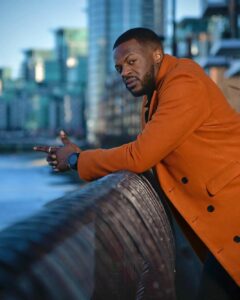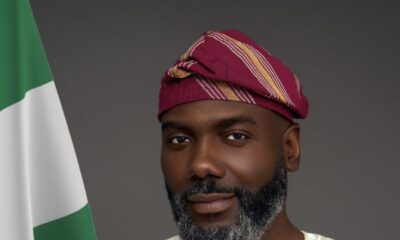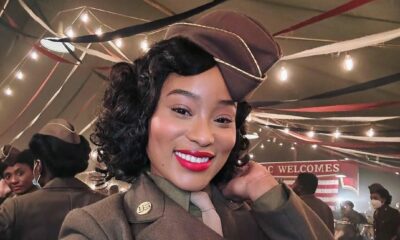In “Supacell,” a group of five ordinary Black individuals unexpectedly gain superpowers, each connected by a shared history of sickle cell. While the series dives into themes like casual racism, healthcare bias, and gender inequality, it also shines a spotlight on sickle cell anaemia, a condition deeply affecting Black communities. But there’s more beneath the surface—viewers who appreciate the nuances of friendship will notice the unspoken bromance, as Michael Salami calls it, between Michael (Tosin Cole) and Gabriel (played by Michael Salami).
Michael and Gabriel are two inseparable friends, navigating life together as close friends do—hanging out in Gabriel’s bar, having deep conversations, and enjoying each other’s company. But everything changes when Michael suddenly becomes a superhuman capable of travelling through space and time. How did Gabriel handle this dramatic shift in their dynamic? We get the scoop straight from Michael Salami in an engaging chat.
Born in America and raised in London, Michael Salami’s acting journey began with a role in “Harry Potter and the Goblet of Fire” (2005). Now an award-winning actor and a graduate of the Stella Adler Studio of Acting in NYC, Michael has left his mark in productions like “Supacell,” “Hollyoaks” and “Sumotherhood.” Last year, in November, he won ‘Best Actor’ at The British Short Film Awards for the short film “Saving Art.” Michael’s versatility extends to the stage, with performances at prestigious venues such as The Old Vic and The Soho Theatre.
We had the chance to talk with Michael about his role in the sci-fi series “Supacell,” how he feels being part of a chart-topping show, the friendship between Michael and Gabriel, his Nigerian heritage, and his future plans.
How I feel today…
“I’m having a great day and I’m glad to be here. Thank you for having me.”
The thrill of being on a chart-topping Netflix show is…
“an incredible honour and privilege. Being part of a show that touches on incredible subjects and resonates with everyone across the world in 80 plus countries, reaching number one, is beyond exciting. So I just feel honoured and excited. It’s really a privilege, honestly.”
Gabriel’s response to Michael’s transformation and the strength of their friendship…
“..is something I find interesting because people often ask me, ‘Would you really do that in real life? Would you keep your friend’s secret?’ And my answer is, yes, I would. Tosin and I were able to establish a great friendship and bromance that resonated with our characters, who have known each other since primary school and have been friends for many years. If you’re a true friend, you’d want to keep your friend’s secret. I still have close friends today, and I’ve kept their secrets. So I believe the way Gabriel kept Michael’s secret was portrayed honestly and realistically. In the beginning, you want to console your friend, as seen in the scene where I was reassuring him, saying maybe it’s not happening. But once Gabriel realised it was real, he accepted it, saying, ‘Okay, you weren’t lying. Let’s keep this a secret. But how are we going to solve your issues, my brother?’ I think it was portrayed very honestly.”
On a scale of 1-10, the intensity behind the scenes of the film was…
“…maybe a five. It didn’t feel that intense because the producers, directors, and Rapman really mastered creating a comfortable environment. Everyone on set felt like family. We were all there with a mission, working hard to give our best to the show. We put everything into it, and thankfully, it resonated with audiences, becoming number one in the world. We’re really grateful for that.”
The most memorable scene to film was…
“…with Tosin Cole, who played Michael, the main character. The scene where he first comes over and tells me about his superpowers was a standout for me. I’m trying to reassure him, saying, ‘Maybe that’s not the case. You’re going to be all right, bro. I’ll be at your wedding. Everything’s going to be fine.’ But my absolute favourite moment to film was when he first appears in the bar, and I’m like, ‘What the…?’ He just jumps out of nowhere. Every time I see that, it makes me laugh because it was such a fun day to shoot. You never really know how it’s going to look because, obviously, in real life, he didn’t actually jump from one place to another. But when we saw it on screen, it really worked.”
The significance of “Supacell” in raising awareness about Sickle Cell and the Black community…
“…is that it represents us and depicts things that I think most people aren’t familiar with, like Sickle Cell. If you walk into a room and ask who knows about Sickle Cell, you’d probably get a very low percentage of people who do. I’m fortunate enough to know more about it because I have friends who go through it, so I have more knowledge than a lot of people.
It feels like an honour to be part of a production that highlights something that predominantly affects the Black community. I love the awareness it brings to everyone. And with a predominantly Black cast, both on-screen and behind the scenes, it feels right; it feels great. But I think “Supacell” is for everyone. Everyone can resonate with it, and that’s evident through the numbers and how it’s gone worldwide.
I love that it resonated with the whole world and that people can see the little nuances of the Black experience. But it’s not just thrown in your face, like, ‘look at us,’ you know what I mean? It’s very much about everyday lives. And yeah, I think Rapman did a great job with the writing.”
If I could have any of the superpowers from the film, I’d choose …
“Sabrina’s superpower, Telekinesis, because it’s incredibly versatile. She can essentially do everything—move herself from one place to another, almost like flying, and even stop things in their tracks. For example, if a bullet is coming, she can redirect it. I also love the idea of moving things with my mind. Imagine sitting down and painting without even touching the brush—just watching it move on its own. That would be pretty cool.”
Even though I was born in America and raised in London, I’ve managed to maintain a strong connection to my Nigerian heritage…
“thanks to my mom, my grandma, my aunties, and my uncles. When I first came to the UK, I didn’t understand Yoruba at all. I was still young, so I didn’t really get it. But thank God for my aunties—they made it compulsory for me to learn it. Every time they came to my house, or I went to theirs, they spoke Yoruba to their children and to me. I remember one time they asked me in Yoruba if I had taken a shower, but I thought they were telling me to turn off the light. So I went to turn off the light, and they were like, ‘No, you do it!’ I was so confused! But as the years went on, they would come up to me and ask the same thing, ‘Do you know it yet?’ Now, I can understand about 98% of it. I love being Nigerian—it’s one of my superpowers, if you will.”
What I find most interesting and exciting about Nigerian culture…
“It’s how we’re just incredibly funny. Our banter is unmatched. I also love the food and how we come together as a village, as a family. There’s this saying, ‘Nigerian never carry last,’ and it’s true—we never come in last. I love that about us. And another thing is our respect—how much we value and respect our elders and loved ones. It’s something we take seriously, and it’s so important. I really love that about our culture.”
The Nigerian dish and song that always hit the spot for me…
“It’s got to be the number one dish in the world—Jollof rice. And I love Ayamase too; it’s my thing. In fact, I’m even planning to cook some today. As for the song, it would be Burna Boy’s ‘Last Last.’ The year that song came out was one of the best years of my life. It was the same year we were shooting ‘Supacell.’ I remember after we finished filming, I went to Thailand, and we played that song every day. ‘We don’t ask, last last, everybody don chop breakfast.’ It’s a really good memory for me.”























